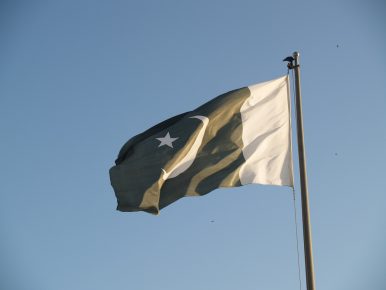By Uzair Younus
 After much debate and speculation following the February Financial Action Task Force (FATF) plenary, the dust has finally settled: Pakistan will be placed on the FATF grey-list in June. It is now worth exploring what this means for Pakistan, particularly its economy, and the potential of this event to cause a shift in the country’s security and strategic calculus. Some analysts have argued that the grey-listing will squeeze Pakistan’s economy and make it harder for the country to meet its mounting foreign financing needs, including potential future borrowings from the International Monetary Fund. They have also argued that the grey-listing could lead to a downgrade in Pakistan’s debt ratings, making it more difficult to tap into the international bond markets.
After much debate and speculation following the February Financial Action Task Force (FATF) plenary, the dust has finally settled: Pakistan will be placed on the FATF grey-list in June. It is now worth exploring what this means for Pakistan, particularly its economy, and the potential of this event to cause a shift in the country’s security and strategic calculus. Some analysts have argued that the grey-listing will squeeze Pakistan’s economy and make it harder for the country to meet its mounting foreign financing needs, including potential future borrowings from the International Monetary Fund. They have also argued that the grey-listing could lead to a downgrade in Pakistan’s debt ratings, making it more difficult to tap into the international bond markets.
The factual evidence, both historic and current, suggests that these assertions are simply incorrect. Pakistan was on the FATF grey-list from 2012 to 2015, a period during which it successfully completed an IMF program and raised over $5 billion from the international bond markets. During this period Pakistan’s imports and exports remained stable, evidence that the grey-listing did not raise any significant barriers to trade.
The reaction of the bond markets to the FATF’s decision has also been muted. Ten-year bonds issued by the country in 2017, for example, have had a decline in their yield from a high of almost 7.4 percent on February 14, 2018 to below 7.1 percent on February 26, 2018. This evidence supports the claim made by Miftah Ismail, adviser to Pakistan’s prime minister, that the economic impact of the grey-listing will be minimal.
It is, however, important to view the FATF’s decision as one of several recent events that should concern Pakistan. Since coming to power, the Trump administration has made a concerted effort to coerce Pakistan into ending its support of nonstate armed groups such as the Haqqani Network. Initially, Pakistan reacted nonchalantly to this shift in policy and released Hafiz Saeed, leader of the Laskhar-e-Taiba (LeT) and the man India holds responsible for the 2008 terror attacks in Mumbai, from house arrest in November of 2017.
President Donald Trump responded via Twitter and said that Pakistan has given the United States “nothing but lies & deceit.” The United States then showcased a willingness to squeeze Pakistan’s finances: the administration suspended assistance of over $1 billion, which included military assistance and the release of Coalition Support Funds (CSF), money which the United States owes to Pakistan for military operations, according to Pakistani officials.
Sensing that the United States would use the FATF’s February meeting to up the ante, Islamabad began to set its house in order. Pakistani President Mamnoon Hussain issued an ordinance that amended the country’s 1997 Anti-Terrorism Act and placed Hafiz Saeed’s Jamaat-ud-Dawa (JuD) and Falah-i-Insaniat Foundation (FIF) on the country’s banned organizations list. The government followed up by taking over both organizations’ assets, which includes thousands of staff and volunteers and dozens of schools and clinics. It is worth noting here that it took Pakistan almost 10 years – JuD had been declared a terrorist front group by the United Nations Security Council in 2008 – to act against these organizations.
Pakistan also mounted a last-ditch attempt to cement support from its traditional allies, including Saudi Arabia, China, and Turkey. To garner Saudi support, Pakistan agreed to send an additional 1,000 troops to Saudi Arabia, something it had refused to do in 2015. All of this proved to be too little too late as only Turkey supported Pakistan at the FATF plenary.
Pakistan has survived previous rounds of international pressure and there is scant evidence that the strategic calculus of Pakistan’s security establishment is shifting this time around. The strategy to mainstream the LeT has not been abandoned: the Milli Muslim League (MML), a political party associated with Hafiz Saeed, was launched last year. United States officials have also said that they have not seen any visible action by the Pakistanis against the Haqqani Network and its facilitators. Civil society continues to be targeted, with Pashtun youth organizing against extrajudicial killings by security forces bearing the brunt in recent days.
Pakistan is a classic case of moral hazard: its security establishment is used to taking outsized risks and not suffering the consequences because of protection offered by one or more international patrons, including the United States. What is different this time around is that China and Saudi Arabia, strategic partners that have historically supported Pakistan, have signaled that they will not unconditionally stand by their ally. There is also an ongoing debate in Pakistan around the country’s security and foreign policy and a growing recognition that policies rooted in the pre-9/11 mindset are leading to greater international isolation. The optimists may cautiously hope that a nudge by the Chinese coupled with a growing domestic debate may finally lead to a shift in Pakistan’s strategic posture. However, those that have closely followed Pakistan would argue that even a cautiously optimistic assessment is too optimistic.
Uzair Younus is a Director at Albright Stonebridge Group. Views expressed are his own.
No comments:
Post a Comment